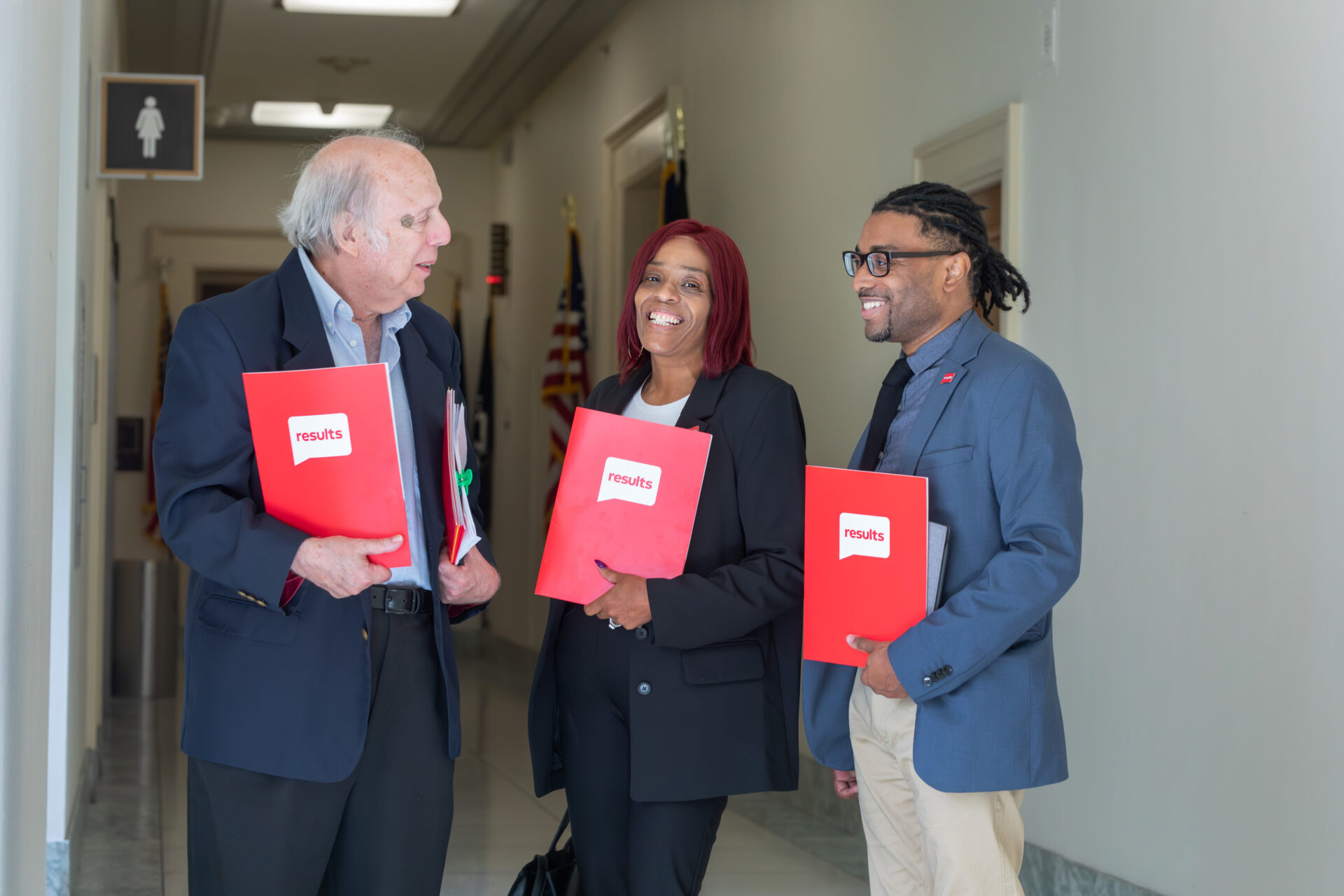“I’m giving myself a voice”: RESULTS advocates take emergency meetings with lawmakers
A dozen volunteer advocates gathered in mid-May in a basement conference room to prepare for a day of advocacy. They were in Washington, D.C. to meet with their members of Congress (MoCs). RESULTS had received an urgent needs grant to bring this small group to the Capitol from targeted areas of the country. The goal was to reach lawmakers whose deciding votes will shape the immediate future of critical anti-poverty programs.
“You may not know the impact you’ve had when you walk out of the meetings you have tomorrow. But you will have an impact,” said RESULTS Executive Director Joanne Carter, addressing the group the morning of their prep day. The advocates, pens in hand, were fully locked in and took notes at breakneck speed during the all-day prep session.
They refined talking points for their MoCs on a pending piece of budget legislation called the “reconciliation package.” It was due for a vote any day in the House of Representatives. Advocates practiced telling their personal stories with critical U.S. nutrition programs like SNAP. They talked about what Medicaid means to their communities. Both of these programs, along with many other crucial services, could suffer deep cuts with the reconciliation package.
Volunteers also shared notes and data about global aid. They honed appeals to invest in lifesaving vaccine access and tuberculosis treatment. The advocates would also ask MoCs to sign “Dear Colleague” letters calling for bold funding for global health. The letters were on the brink of closing. For all, time was of the essence.
By the end of the day, they were ready for the conversations with policymakers.

Advocates bring their expertise to Capitol Hill

Each volunteer brought their own stories, passion, and expertise to the meetings.
Raegen Selden of Pennsylvania brought her experiences being a parent and grandparent as well as an advocate on the Parent Advisory Board for the Automatic Benefit for Children (ABC Coalition).
“I have six children and three grandchildren, so I’ve always been their biggest advocate, and I’ve also always told them that nobody is going to advocate for you more than yourself. I’m giving myself a voice, letting people know how SNAP and Medicaid continue to be important to me.”

Edith Martinez of West Virginia came to Capitol Hill carrying over 30 letters to the meetings from different individuals and organizations directly impacted by basic needs programs. “I am covering seven to nine counties in West Virginia and representing on behalf of them here today. I believe that there’s hope and faith that the people in Congress are there to do the right thing. And I appeal to that human part that they still care for the people that they represent.”

Elizabeth Brown of North Carolina brought nuanced expertise in basic needs programs: “I’m someone who grew up in poverty, and we wouldn’t have had food on the table if it weren’t for SNAP and Medicaid. I know so many other people who need a little support and an extra boost to create stability for themselves. But programs like SNAP and Medicaid don’t work as well as they could in helping to support the community. That’s why I started doing advocacy work and that’s why it’s so important to me.”
“Key moments ahead”
The advocates held more than two dozen meetings with members of Congress and their aides throughout the day. They spoke with congressional leaders from several key districts.

Will Engfer from New York reported back after one of his meetings that aides seemed receptive to his message. This lawmaker’s voting history meant receptiveness was not guaranteed. “The meeting was very good. We made some important points about how these issues will affect our state. I want to follow up and keep the lines of communication open. Hopefully going forward we can build more bipartisan support for these issues. There are still key moments ahead of us.”
The House of Representatives did end up passing the reconciliation bill with its draconian cuts to Medicaid and SNAP, a disappointment for all. But, these advocates secured several pledges from key senators to resist or change the bill before passing it into law, creating important momentum for our work in the weeks ahead.
Alyssa Rodriguez from Iowa shared that she was disappointed in the vote results for the reconciliation package, but grateful for the preparation and the opportunity to speak with MoCs on Capitol Hill. “Afterwards, a lot of people were asking me about the bill. Now I am able to break it down and get more people to call their senators. Spreading the message to other people is really important.”
The global aid Dear Colleague letters closed with a record number of bipartisan signers voicing support for an unprecedented billion dollar ask for tuberculosis programs. Not only that, every single global aid Dear Colleague letter on the House side was bipartisan led.
RESULTS did what it does best: forge a unified movement to fight poverty regardless of political context.
